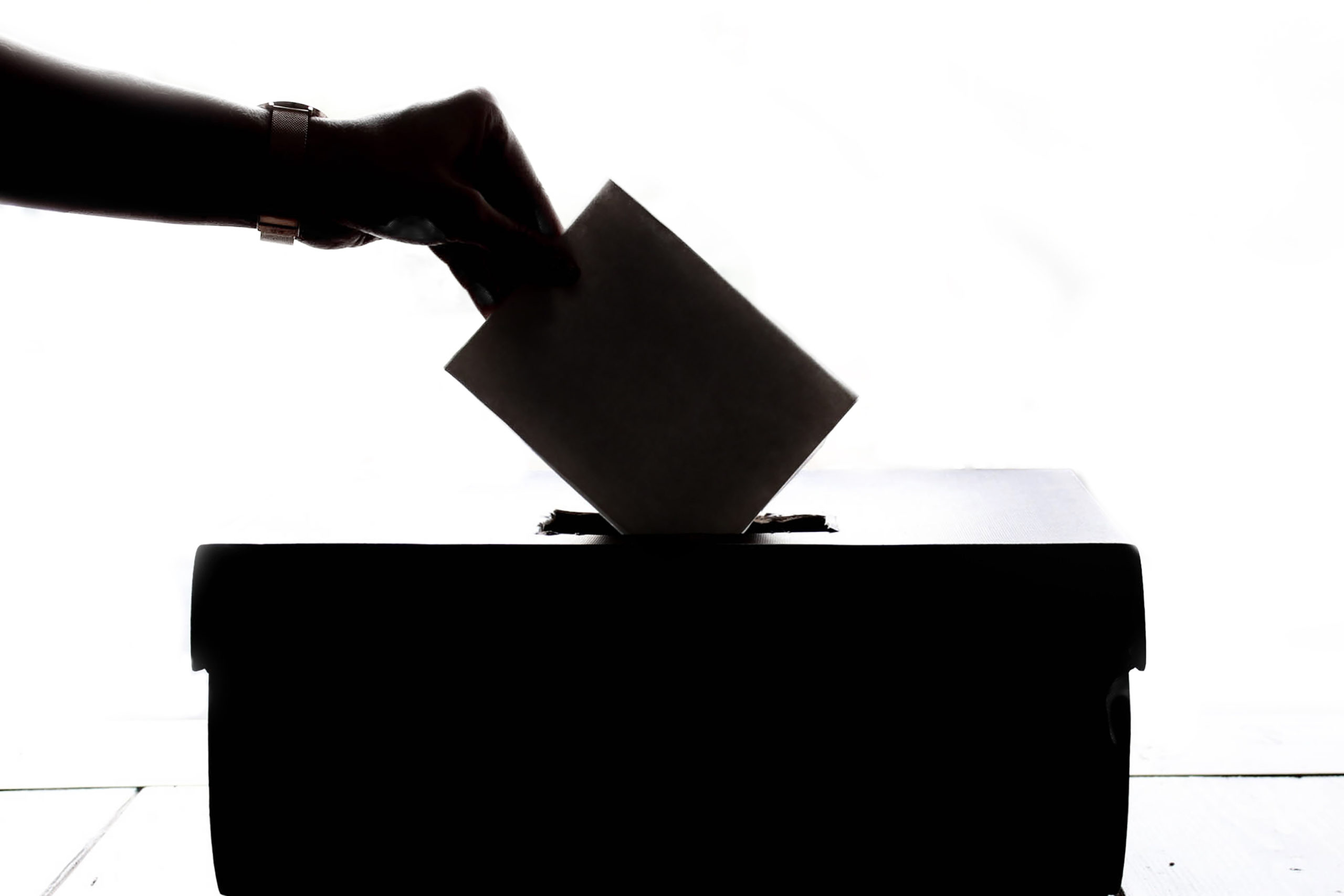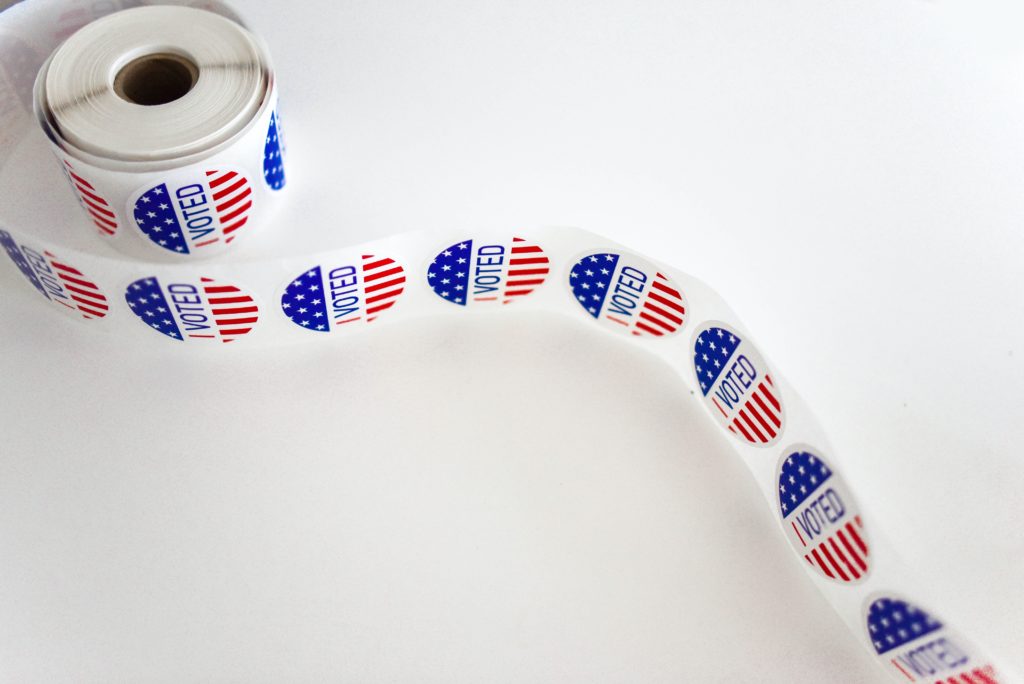
Religion and the Presidential Election
Steven K. Green
Photo by Element5 Digital | Unsplash
It has been ten presidential election cycles since Ronald Reagan defeated the nation’s most religiously devout president, Jimmy Carter, a feat he accomplished with the overwhelming support of conservative Christian voters. The preceding year (1979) had witnessed the rise of the “Moral Majority” and the Religious Right, and Reagan’s election apparently cemented the relationship between the Republican Party and conservative Christians, turning the latter into the most reliable voting block for the GOP (known to some as “God’s Own Party”). Since 1980, Republican candidates for higher office have made the trek to Lynchburg, Virginia (home of Liberty University) and have appeared at the Values Voter Summit, among other religio-political events, to receive the blessings of (white) evangelical leaders and to re-consecrate the marriage of the two groups.
For forty years now, political scientists, religious studies scholars, and pundits have analyzed and dissected this relationship and the larger role of religion in politics. (Of course, religion in politics is not a recent phenomenon, as it played a significant role in the presidential elections of 1800, 1928, and 1960, to name a few.) Is it that Republicans tend to be more religiously observant and socially conservative, such that Republican policy stances align with those of white evangelicals? It is that Democrats are more likely to embrace a secularist worldview and to be dismissive of religion? Or is it simply that Republican candidates have been more willing to employ “God talk” and exploit the low-hanging fruit of religious rhetoric? Not only was the evangelical George W. Bush adept in using religious discourse, but so, too, was Ronald Reagan, who was less than a nominal church-goer (and then, one remembers the awkwardness of Bush’s father, an Episcopalian, in speaking the language of evangelicals). Scholars and commentators have drawn most of these conclusions.
Yet, even though the alignment of religious conservatives with Republican candidates is presumed, the overwhelming evangelical support for Donald Trump caught many observers by surprise. After all, Trump is a thrice-married, coarse-talking television personality who operated gambling casinos; he is hardly a model church-goer, preferring to play golf on Sundays, and he has demonstrated a lack of familiarity with (if not disregard for) the Bible. In a March poll, Pew Research Center reported that even evangelicals “do not view Trump as very religious, honest or [a] morally upstanding person.” Simply put, Trump is an unlikely character to earn the respect and loyalty of evangelical Christians. Yet, according to the Pew Research Center, Trump received approximately 80% of white evangelical votes in 2016. More recent polls (PRRI) have shown that evangelical support for Trump has slipped into the mid-60th percentile, but most observers expect those numbers to grow as the Trump campaign seeks to portray Democrats, and Joe Biden in particular, as anti-religious.

Explanations vary for the high support of Trump among religious conservatives and for their willingness to ignore his moral failings. Some argue it is as simple as Trump’s stances on hot-button issues that are of concern to religious conservatives: abortion, marriage equality and LGBTQ rights, and the appointment of conservative judges, to name the more prominent ones. Other commentators, like Sarah Posner, claim that Trump has tapped into something more visceral among white evangelicals, chiefly through his law and order and immigration stances, viz, a feared loss of status, power, and privilege. Building on that theme, Kristen Kobes Du Mez argues that Trump has promoted an image of himself as a “strong man” with “militant masculine” qualities which resonates with evangelicals who have long been attracted to patriarchal authority. There is merit in all of these explanations. If there is a theme that unifies much of Trump’s rhetoric, it is that he is the one to protect “traditional” American values from the onslaught from the Left, secularists, and the “others.” As Trump told a cheering audience at the 2017 Values Voter Summit, only he would “defend our faith and protect our traditions.”
So, will religious issues take on a prominent role during the remaining two months leading up to the election? With so many other issues in the spotlight – the health and economic consequences of the COVID pandemic, racial justice concerns, foreign interference in the election – religious issues are not likely to be front and center in the mainstream campaigns; however, they may play a role among targeted groups. Back in early 2020, the Trump campaign launched a massive outreach effort to court religious voters and to turn them out in November, including Evangelicals for Trump, Catholics for Trump, and Jews for Trump, though the focus is clearly on the first group. Trump has several surrogates who can reach out to religious conservatives, the most notable being Vice President Mike Pence, an evangelical Christian with close ties to the Christian right. Pence frequently addresses conservative religious groups and has long been Trump’s chief emissary to the evangelical community, assuring its members that they can rely on the President, despite Trump’s lack of religious bona fides. Other Trump surrogates have used scare tactics, telling religious gatherings that Democratic politicians are using COVID restrictions to shut down churches as part of their anti-religious agenda. “The Democratic Party today has been taken over by the spirit of the anti-Christ. “It’s an evil party,” one speaker told an Atlanta audience in August. Such rhetoric is unlikely to gain new converts; rather, it serves chiefly to motivate his base to “get out and vote.”

Whether the mercurial President Trump will elevate religious issues in the upcoming months is anyone’s guess. Trump has already attacked Biden on his faith, stating that he is “against God.” Days before that statement Trump told an Ohio audience that Biden was “following the radical-left agenda: take away your guns, destroy your Second Amendment, no religion, no anything, hurt the Bible, hurt God.” Trump is scheduled to address the Voters Value Summit in late September, so more such rhetoric may be forthcoming. It is relatively low-hanging fruit.
The Biden campaign also has a faith outreach component — “Believers for Biden” — that is seeking to reach out to a diverse group of religious communities – Catholics, Mormons, Jews, Muslims, Hindus – while emphasizing a more compassionate set of issues: poverty, hunger, homelessness, and immigration. The campaign has announced a “Plan for Safeguarding America’s Faith-Based Communities,” which, as the title suggests, is oriented toward promoting and protecting religious pluralism, including steps to battle hate crimes. Joe Biden also seems more comfortable talking about how his Catholic faith informs his political views on issues such as poverty, race relations, and civil rights. So the Biden campaign appears to be taking a more subtle approach toward religious issues.
All of this raises two questions. First, will the overtures from the campaigns to religious voters and groups make any difference? As sociologists have noted, few devout voters define themselves solely in religious terms or vote only on the basis of religious issues; as a result, a push to reach out to religious communities may be unnecessary. Also, it is likely that both Trump’s and Biden’s outreach campaigns are – forgive the pun – preaching to the choir; it is unclear whether the efforts will attract new voters. More likely, the efforts are geared to motivating existing supporters and to preventing “melt” among wavering supporters. The second, and more existential question, is whether religion can emerge from this election without receiving its every four-year black eye. Many religious advocacy groups, such as the nonpartisan Baptist Joint Committee for Religious Liberty, lament how easily politicians manipulate religious issues, usually to the detriment of religious communities. In 2018, Baptist News Global asked whether the undying Christian support for Trump could even spell the end of the evangelical church. It is no wonder that the alignment of conservative Christians with the Republican Party – along with the capture of the word “Christian” – has facilitated a disdain for religion among some Democrats. While this has ramifications in the political realm, it also leads to the tribalization of religion, which has deleterious effects on religious pluralism. For many years, Jim Wallis of Sojourners has been a voice crying in the wilderness about the delegitimizing effects of the politicization of religion. Despite these voices of wisdom, it seems we will never learn. ♦

Steven K. Green is the Fred H. Paulus Professor of Law and Affiliated Professor of History and Religious Studies at Willamette University in Salem, Oregon. He is the author of six books and over forty scholarly articles and chapters on church-state matters, and he regularly collaborates on amicus curiae briefs at the US Supreme Court.
Recommended Citation
Green, Steven K. “Religion and the Presidential Election.” Canopy Forum, October 5, 2020. https://canopyforum.org/2020/10/05/religion-and-the-presidential-election/

